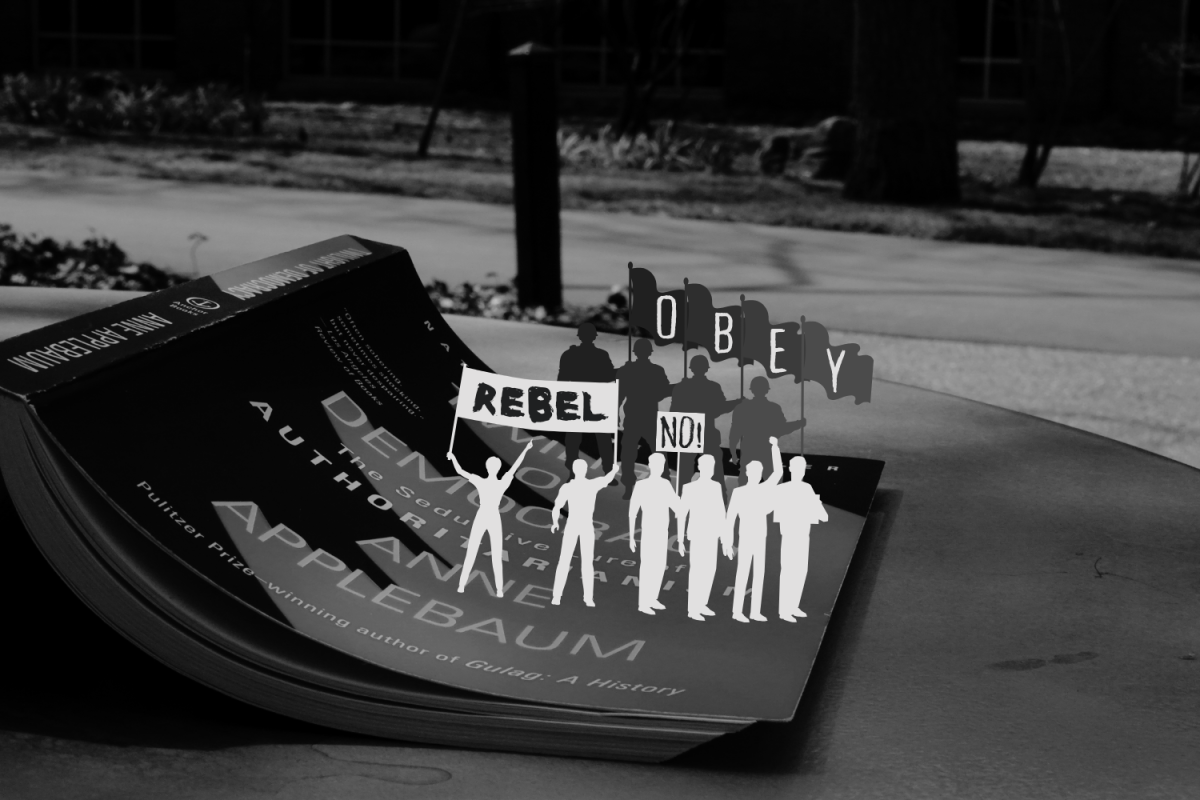Being a political science enthusiast, I picked up a complimentary copy of one of the most influential books I have read. “Twilight of Democracy,” written by Dialogue Vanderbilt guest speaker Anne Applebaum, chronicles the trend of authoritarianism within Western democracies. In the span of fewer than 200 pages, Applebaum develops a compelling claim that today’s democracy is at severe risk of collapsing under the “seductive lure of authoritarianism.”
The book opens on New Year’s Eve of 1999 in rural Poland. Applebaum is throwing a party. Disorganized across multiple barns, Applebaum keeps an extensive list of where all her friends are at the party. Applebaum describes the family-like relationships she has with almost every one of her guests, mentioning how many of them aided her in personal projects such as helping her write a cookbook. Applebaum follows up such a rose-colored scene with an abrupt time skip, explaining that these guests rarely speak to each other anymore. By the end of the first chapter, Applebaum begins to flesh out the memoir motif. She repeatedly uses the decline of her relationships with said guests as a metaphor for the fragility of democracy. Just as her former relationships fell, so can democracy die with the transition of ideologies, highlighting a sense of potential instability within our political system.
Applebaum elaborates in the following chapter, citing Julien Benda’s book “La Trahison des Clercs” to describe her former friends as clercs for authoritarian governments. These clercs are developed when intellectuals or media personalities appease the authoritarian regime in an attempt to get state approval, such as openly defending a dictator to earn a position hosting on state-controlled television. Applebaum defines the clercs as the mouthpieces of these oppressive regimes, acting as the state media personalities intellectually defending their actions. Applebaum goes on to deem these clercs a threat to modern democracy due to the propaganda they loyally create on behalf of their leader.
The book’s first half describes the rise of authoritarian regimes all across formerly Soviet unions, journaling the rise of the Law and Justice party in Poland. Alongside that, Applebaum writes about her former friend Mária Schmidt becoming a Hungarian state personality for her career propulsion. She pulls no punches in chronicling the rise of such regimes in Eastern Europe, creating a fascinating backdrop for the later chapters.
The book’s second half addresses the idea of Western invincibility to such propaganda, especially within the democratic bastion of the United States. Applebaum directs the audience toward Great Britain to provide an example of how authoritarian governments use fear to rise to power. In this stop, she masterfully describes the rise of Boris Johnson’s power as prime minister and the impact both he and his party had on influencing the historic Brexit vote. She describes the supposedly unethical tactics committed by Johnson’s party, ranging from promising national budget raises to fear-mongering the idea of migrants invading Great Britain. He claimed all of this hung in the balance of whether the people approved Brexit. Such tactics, Applebaum describes, are crucial to developing political control for regimes in traditionally democratic nations.
Applebaum continues by touching on the United States. She blames the rise of authoritarianism in the United States on “far-right American pessimism” held by political figures such as Patrick Buchanan. Applebaum directly critiques the pessimistic views held by Buchanan by mentioning his hypocrisy; Buchanan is known for favoring Putin’s government over the United States, praising a government that, as Applebaum claims, goes against every core Christian value held by the politician. Applebaum blames this pessimism as the kindle that forged the anti-establishment rhetoric exploited by President Donald Trump. Applebaum describes this hate-filled rhetoric as being full of accusations of supposed corruption within the United States government. She further claims that Trump bases his evidence on claims of a supposedly corrupted Department of Justice and Federal Bureau of Investigation. This shift in the ideologies of some of America’s more conservative citizens concerns Applebaum, as she fears for the future of American democracy under their rule.
Applebaum nears the conclusion by describing the idea of unseen arguments through the story of Captain Alfred Dreyfus’ trial in 1894. Dreyfus was falsely accused of treason and was sent into exile by the French government. Although the evidence was lackluster, fear-mongering pushed the courts to rule against Dreyfus. In the aftermath of the trial, even decades later after the story of the trial resurfaced, the French people were split in their opinions of the court’s decision. Applebaum uses this story to highlight how rapidly core opinions — and guest lists — can change from only one controversy.
The book’s conclusion masterfully brings the piece full circle, contrasting the guests present at Applebaum’s aforementioned 1999 party to those who attended her August 2019 party. She describes that although the guest list has changed since almost 20 years ago, many old guests came from all over the world, creating a melting pot of hope for democracy with the increased globalization of our society. This optimism is furthered by Applebaum, who speculates that the shared global experience of the COVID-19 pandemic could help unite the world in solidarity. Applebaum finishes by warning the reader about the risk of permanent political victories, stressing the importance of preserving democracy.
Overall, Applebaum does a masterful job of painting the portraits of authoritarian regimes around Europe, especially within the scope of American politics. “Twilight of Democracy” provides valuable information for Vanderbilt students preparing to vote in the November presidential election by highlighting the importance of properly informing voters before elections. This is especially crucial at Vanderbilt where civil discourse is encouraged by the administration. Most recently, some groups on campus have argued that the university breaches their First Amendment rights, making the contents of “Twilight of Democracy” especially pertinent and a must-read for anybody interested in government censorship and advocacy.







